“Rick Rubin is one of the most inspirational guitar players of my childhood. It’s a curveball, isn’t it?!” Justin Hawkins names the 14 guitarists who shaped his sound
The Darkness frontman turned YouTube personality on why Keith Richards’ playing is underrated, what makes Eddie Van Halen’s solo blueprint so spectacular, and why guitarists who “make you feel like you want to grab a guitar and do it” are more important than any virtuoso
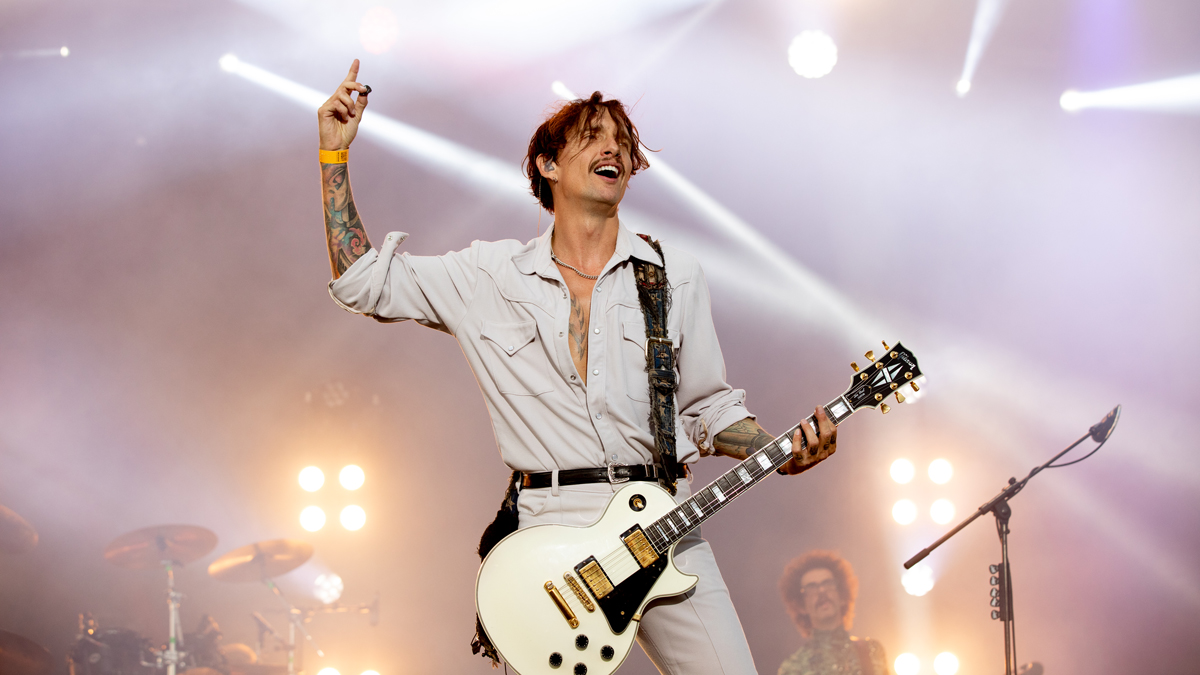
As the late ‘90s rolled into the early 2000s, Justin Hawkins was making a living as an advertising jingles writer, relying on his “slightly encyclopedic understanding of a lot of certain types of music” to knock out quirky commercial earworms and canny sound-alikes to order for a range of household name brands’ ad campaigns.
“With a lot of those gigs, it would always be that they wanted something but they couldn't afford it, so they’d get me to copy it and do something that’s not suable,” laughs the charismatic guitarist, speaking to Guitar World from the instantly recognizable home studio of his Justin Hawkins Rides Again YouTube series. “I’d change enough chords and make the melody different enough to be able to get away with it, really.”
Around the same time, The Darkness were busy workshopping their bombastic rock sound in dingy rented studio spaces and making a name for themselves on the “sweaty circuit” when a particularly lucrative Ikea job came along. Justin’s paycheck for the jingle (which is well worth looking up on YouTube, by the way) helped fund the band’s multi-platinum, chart-topping debut album, Permission To Land, which as of this July has reached the ripe old age of 20.
Stuffed with howl-along anthems like Get Your Hands Off My Woman, Growing On Me, Black Shuck and – of course – I Believe In A Thing Called Love, the album served to reignite a passion for rock n’ roll in those who’d lived through its glorious heyday, and sparked an irrepressible urge in a much younger generation to pick up a Gibson Les Paul, plug it into a Marshall stack and aspire to rock stardom.
“It’s weird, because we would have liked to have been part of a scene – like a spearhead of a scene – but it didn’t really work out like that,” ponders the spandex-loving frontman – whose glam stylings, gymnastic on-stage tendencies and penchant for flashy white Les Paul Customs more than set him apart from the indie cool kids, earnest singer-songwriter types and ragey nu-metallers of the day. “I think what actually happened was we became like a gateway drug for some of the harder stuff, or stuff that I was listening to.”
“There was huge stuff and up-and-coming stuff, but not much in the middle of the mainstream,” he adds, citing AC/DC as the old guards still holding onto stadium territory, and Jet and The Datsuns as notable contemporaries on the rise alongside his own band of rock saviors. “I just think the prevalent guitar music at the time didn’t have solos in it. That was the real problem.”
Having done more than its fair share of heavy lifting and string bending to rectify the situation, Permission to Land’s big birthday is to be celebrated with the release of a special 20th anniversary edition on October 6 called Permission To Land… Again, which will contain previously unheard demos as well as the 10 original studio cuts we know and love.
Get The Pick Newsletter
All the latest guitar news, interviews, lessons, reviews, deals and more, direct to your inbox!
The band will also be piling back into the mothership from whence they first descended for a global anniversary tour this fall, with US dates kicking off on October 3, European dates on November 7 and UK dates on December 2.
“We’ll be playing every song in the order that they appear and another set full of all the other weird songs from around that time that were sort of bonus tracks and B-sides,” promises Hawkins.
“We’ll play stuff that nearly made it to the record and didn't but it’s all going to be from that era. I want to be strict about that, because we talked about doing a bonus set with other songs from our career, but it’s not worth it. I really think it should be a strict 20th anniversary. It’s a special record and I think it deserves it.”
As a musician who has given us some of the most memorable rock songs, riffs and solos of the 21st century, you have to wonder where Justin Hawkins learned it all. To that end, the Les Paul-slinging, falsetto-singing maestro dialed in to talk us through 14 of the guitarists who have most profoundly influenced his own sound.
Turning to the first name on his list, he chuckles, “I’m going to surprise you with one,” and surprise us he does…
1. Rick Rubin
“One of the things that made me want to play guitar was the Run-D.M.C. album Raising Hell. Obviously Walk This Way is amazing, but the thing that I think was accessible as a novice guitar player was the stuff that Rick Rubin was playing.
“On the title track, Raising Hell, there’s some nasty guitar playing that’s achievable and you can get those kinds of sounds from a practice amp. He was just keeping it simple, but with loads of attitude and it was really cool.
“If you have any aptitude for it, you can play that sort of stuff pretty quickly and it‘s just really satisfying. It kicks you on to do other playing. So, I'm actually going to say Rick Rubin is one of the most inspirational guitar players of my childhood. It’s a curveball, isn’t it?!”
2. Mark Knopfler

“In an effort to finally obtain some sort of affirmation from my father, I'm going to go for Mark Knopfler. He’s just fantastic. I remember Alchemy: Dire Straits Live – especially Private Investigations – and I think what I love about Mark Knopfler’s playing is that there’s so much expression in the vibrato.
“There’s not that much of a dirty sound, unless you’re talking about Money For Nothing, which I’m not really. I’m talking about everything else from their oeuvre, where he’s just super-melodic, really inventive and never really treads the same ground twice. Whatever the chord sequence happens to be, if it’s in rotation, he finds a million different ways to express the melody and it’s so clever.”
3. Buddy Holly
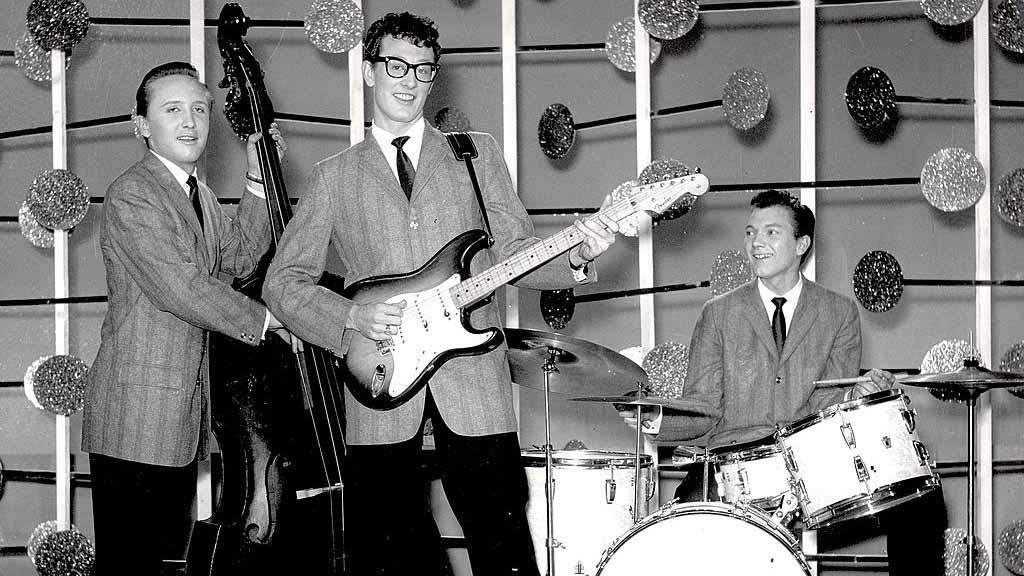
“When you think about… [reaches for a guitar and starts playing a Buddy Holly riff], there’s three chords and then it’s actually the solo. Something kicks in and it’s really loud, but it’s just him playing those chords.
“They’re not fancy chords; they’re not 9ths, they’re not even 7ths. They’re just full triad chords played in the first position and he makes solos out of it. If there’s ever been somebody that inspires you to pick up a guitar, it’s that guy, because he can do it all and he doesn’t really do anything! He just writes brilliant songs and the solo is some chords that we already know.”
4. Richard Thompson
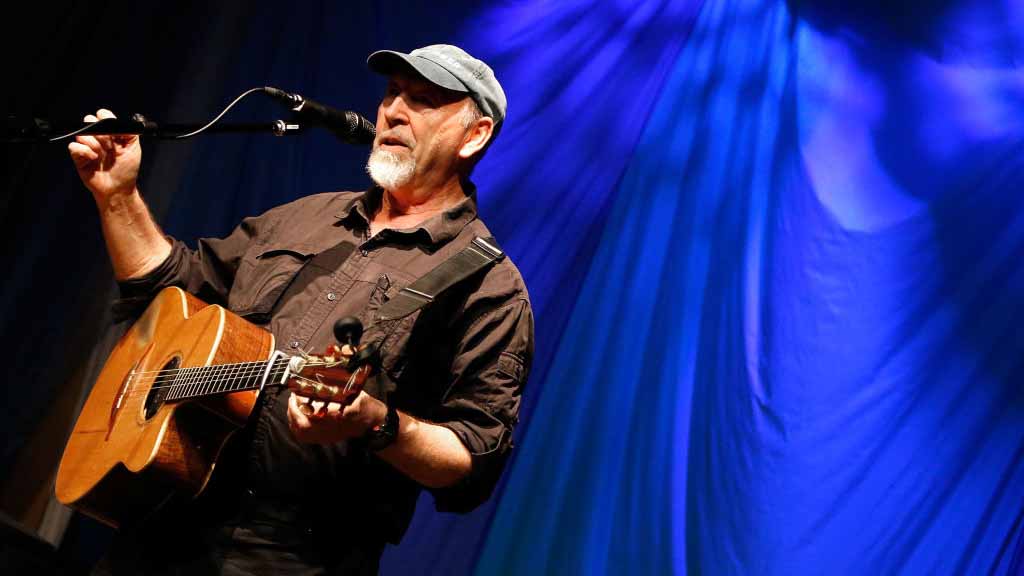
“I’m not suggesting that the way I play, especially not in The Darkness, sounds anything like what Richard Thompson does. But, when you listen to him and you hear him soloing – and I know a lot of his stuff is recorded live, but I’m talking more about the Amnesia period or the stuff in the ‘80s where he’s out on his own but he’s got a band behind him – he’s got a bit of that Lindsey Buckingham thing about him.
“When he goes off on a run, he never fails to surprise me. You think he’s going to do something, and he just takes it in another weird direction. I’d love to know what’s going on in his brain, because the neural pathways that nearly every guitar player has, he’s just ignored and he stamps through – not even as the crow flies. He does tangential meanderings that other brains just wouldn’t conceive of. He’s probably done a lot of mushrooms or something like that – I don’t know how he does it!
“He never plays what you expect him to play, but it’s always the right thing. He’s just one of those players where, when he does something, your ears prick up. I think that’s something that’s absent if you stick with a collection of licks as an approach to making a guitar solo.”
5. Jimmy Page
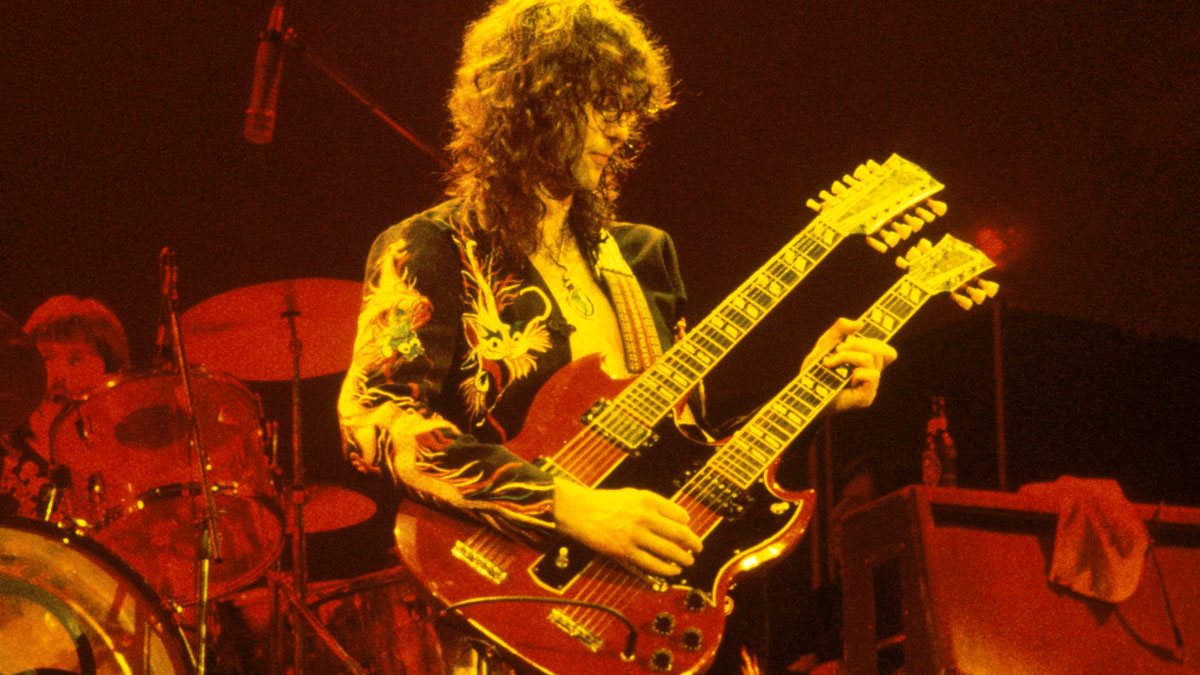
“I don’t think I’ve listened to anything more than Led Zeppelin. They’re the band I’ve heard more than anything else in my whole life. When I listen to Jimmy Page, I kind of know that he’s an economical player and a lot of the trick to understanding how he approaches stuff is to do with the tunings.
“Since Covid, I’ve had to transition into something like a guitar teacher at times, and when someone asks me to look at a Led Zeppelin thing, it’s like, ‘Okay, I’ll do it,’ but I’ve never done it before because I know that the mystique will vanish for me.
“He’s got a way of sounding otherworldly in a really economical way. You see people who can do that in traditional tuning and, yeah, it’s really impressive, but it stops you from wanting to play because it’s like, ‘Ah, okay. This guy’s nailed it. There’s no need for me to be here with this guitar at this point.’ Page never has that vibe.”
6. Luke Morley
“The first gig I ever went to see that was a proper gig – a big gig – was Thunder. Bands never came to my town, but they also didn’t always come to Norwich, so the first band I saw when I was 15 or 16 was Thunder at the UEA [University of East Anglia] and Luke Morley had a left-handed white [Les Paul] Custom.
“It was amazing. It was just amazing. It looked so cool slung down to his knees like you need those guitars to be and it was just really impressive. He’s a great blues-rock guitarist and I really love those songs from Backstreet Symphony. Marshall, Les Paul – you can’t go wrong!”
7. Brian May
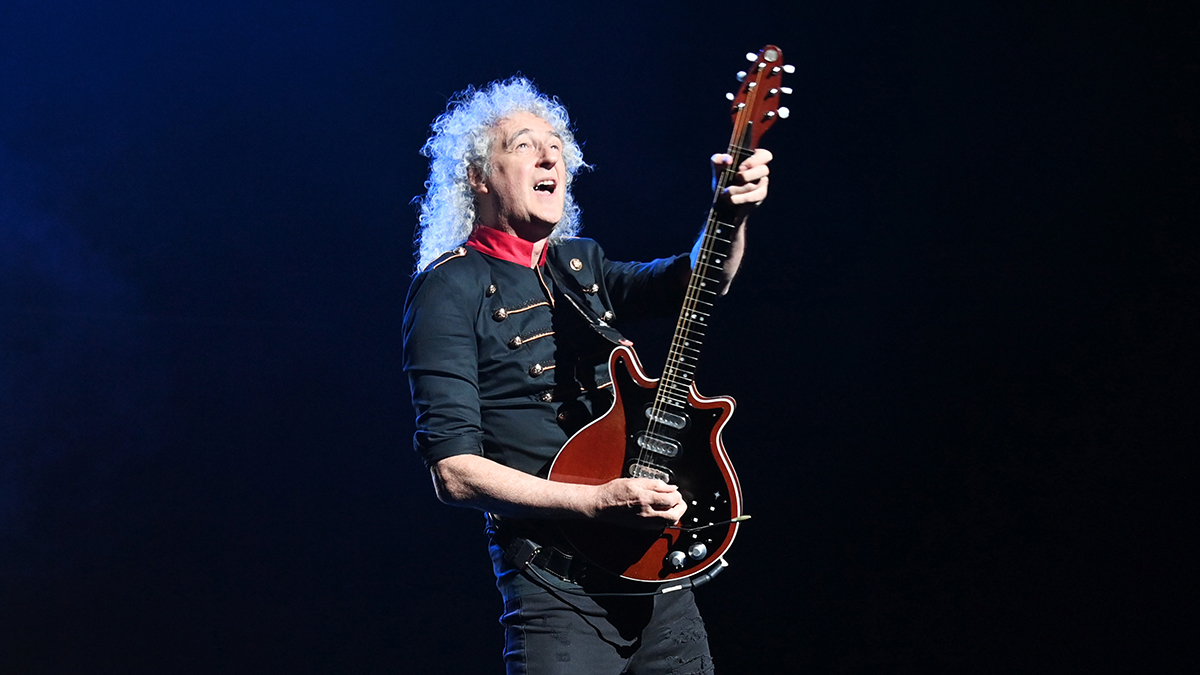
“I’ve got to say Brian May. It’s almost too obvious but it’s got to be done, just because I think there’s sophistication in his playing and he’s equal parts Vaudevillian orchestra pit player and Rory Gallagher. He’s a cross between those two, depending on what song he’s playing at the time! I also think that a lot of the stuff Brain May wrote was incredible.
“You know when you hear a ‘90s indie band, or even The Brian Jonestown Massacre or even anything later than that? I always think: Queen invented that, just when they were arsing around on a song that wasn’t even one of the big songs on one of their records.
“They’ve got a song that sounds like all of that indie. It’s like a modern interpretation of some sort of psychedelic ‘60s thing, and Brian May writes that stuff in his sleep. I think he invented that whole genre, and they would never admit that or credit him with that, but he’s invented a lot of subgenres that almost became the prevailing type of guitar music in the ‘90s. A lot of it came from Brian May. I’m certain of that.
“But he’s a rocker. He’s a good old-fashioned rocker with an amazing brain and a great way of building melodies and harmonies.”
8. Tim Smith
![Cardiacs - A Little Man and His House Music Video [w/ The Seaside 2015 Reissue Audio] [720] - YouTube](https://img.youtube.com/vi/LSbRmyVMRhU/maxresdefault.jpg)
“I need to say Tim Smith from Cardiacs, who is sadly no longer with us. He’s influenced me as a singer and as a guitar player, but also as a songwriter. He had a certain mania to his approach to all of those things that I’ve definitely taken on and tried to incorporate.
“Listen to A Little Man and a House and The Whole World Window. Listen from the beginning of it to the end because it’s fucking brilliant. There’s so much interesting stuff in there, and it plays like a concept album because there’s mnemonic devices that keep coming back through all the songs.
“Then they’ve got a song in there called Is This The Life? which just doesn’t sound like anything else on the record and it’s a really gothy thing with a strange progressive solo bit in the middle. I can strongly recommend that record and also On Land and in the Sea is the other album that I love.
“The stuff they were doing back then, you could probably do it quite easily now with laptops. But the counting involved and keeping track of where you are is really clever and just manic.
“It’s the soundtrack to what happens in my brain when I close my eyes. It’s great guitar playing, it’s great songwriting and it’s just really intense.”
9. Angus Young
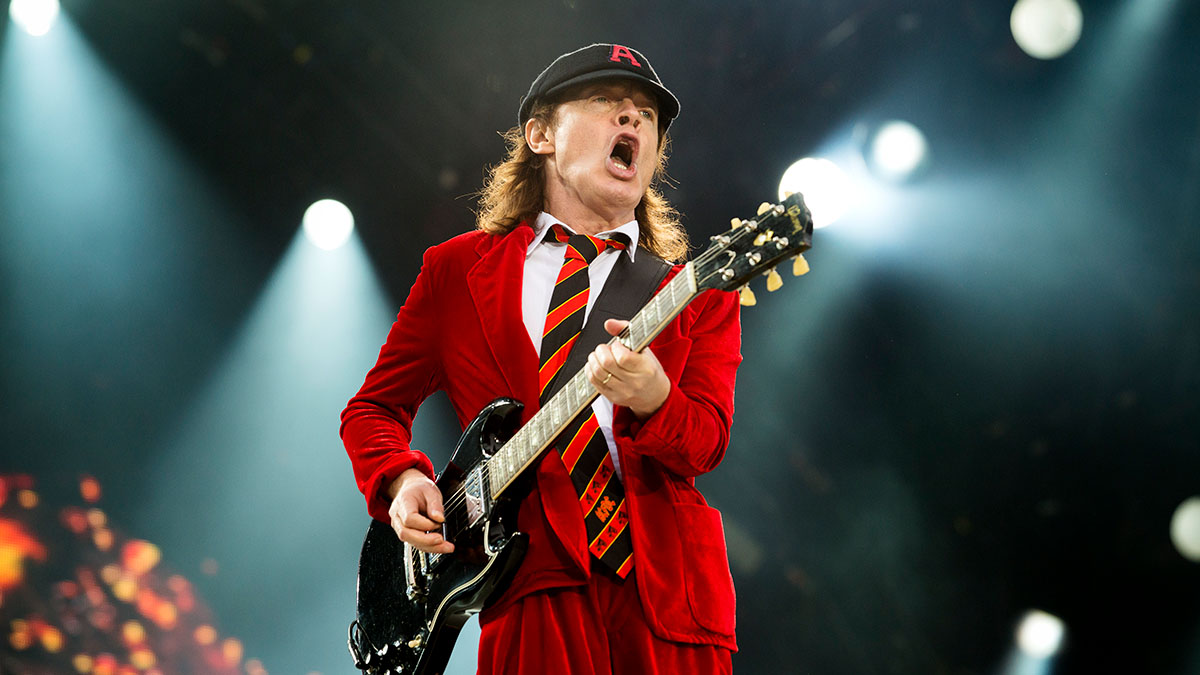
“I think when you’re trying to do a band and you’ve got two guitar players, there are two bands that you need to look at: AC/DC and Guns N’ Roses.
“I love everything about Angus’s soloing. I love the way it’s got a distinctive vibrato – it’s almost like a B.B. King vibrato – and people dismiss him as a Chuck Berry plagiarist, but it isn’t that. He’s got his own thing and you can hear him a hundred miles away. He’s operating mostly in pentatonic scales doing blues soloing and yet he’s still distinctive, and he’s one of the people that sort of makes you want to do it.
“You can talk about the merits and how brilliantly accomplished certain virtuoso players are, but if they don’t make you feel like you want to grab a guitar and do it, then they’re not as important as people like Angus.”
10. Slash
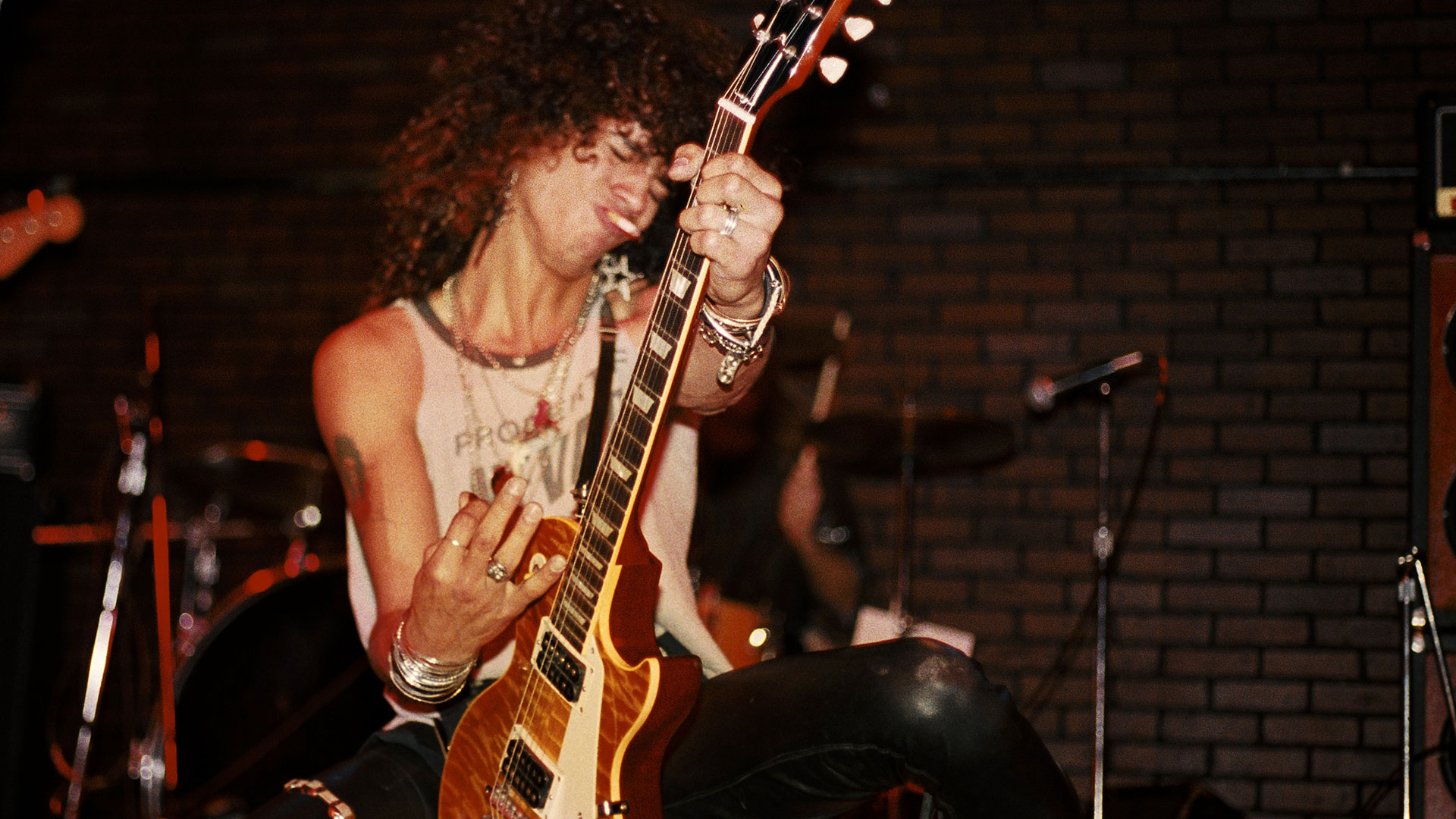
“I love Slash because he looks awesome. I think he’s a distinctive player as well. I love the tonality of the way he uses – I think – JCM800s because he’s soloing a lot in his rhythm pickup position on a Les Paul and doing it in that Slash way. It’s one of those things where you can nearly sound like Slash but not quite.
“I think Guns N’ Roses’ Appetite For Destruction was the only time I was gifted a tablature book. I sat and worked it all out, and it’s some of the most satisfying study you can do because a lot of his stuff is really intricate and really expressive.
“The important thing is knowing when to go from one pickup to the other, so there’s tonal range in the way he plays, and you can recognize him on sight and by ear. He’s super-distinctive and for a guy that’s another Les Paul player to stand out to that degree, you’ve got to be special. And he is. He’s extra-special.”
11. Keith Richards

“I think about the inversions that Keith Richards plays when I’m soloing in a major key because it helps me hit the relative minor, and then some of the licks that you would use in a blues minor scale still work, but they’re the relative minor and you just have to land somewhere else!
“Whenever you hear a D and Keith Richards is playing it, he’s only playing the third and the fifth. He’s not playing the root. He’s letting the bass take care of the root, which I think is the coolest way to play anything rhythm-wise. But once you do that, and you’re in that position, then you’re on the B minor fretting for a relative minor solo, which is a de facto major solo, isn’t it?
“So, Keith Richards is number 11, ‘cos chord voicings! Also, if you study the way he plays, I think it helps you to understand orchestration as well, and the way that it’s not necessary for everything to do everything. It’s about understanding your role.
“People say he’s cool and that he’s the coolest guitar player and all that sort of stuff, but they’re overlooking the really important stuff that he does, which widens the sound because he’s only handling the third and the fifth most of the time and letting the bass player du jour take care of the root. That’s what gives them that Rolling Stones vibe, I think.
“If someone said, ‘Do a Rolling Stones number for this advert,’ that’s how I’d be approaching it!”
12. Eddie Van Halen
“There are so few pioneers when you really break it down to the people that invented stuff, that he’s got to be the ultimate pioneer of that kind of glam ‘80s rock stuff. I love the way he structures his solos – because there is a way of doing an Eddie Van Halen solo.
“You only have to listen to one song and it’s always the same blueprint, but it’s fucking spectacular every single time, right down to the stuff he did on Beat It, or anything off 1984. It’s brilliant.
“I always come back to the same thing: I think guitar players that make you want to pick up a guitar are the ones that I think are really, really important.
“There’s nothing more satisfying than trying to play one of his things and getting somewhere near it. That feels so good and stuff that feels good is all I’m interested in – all I’ve ever been interested in!”
13. Lindsey Buckingham
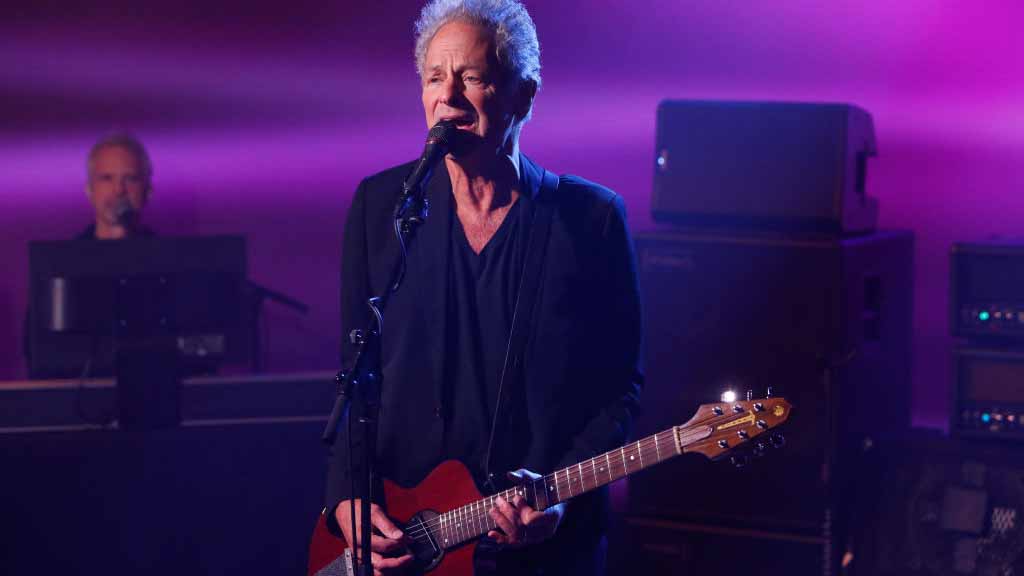
“I like hybrid players and I’ve always done that myself. I got told off! I had a guitar teacher for about a year, and when I sort of started teaching myself stuff – tapping and things that were outside of his remit as a teacher – he was pleased about some of it, but he was very upset that I was abandoning my plectrum technique and using the Knopfler claw!
“But I love Lindsey Buckingham because the fingerstyle stuff’s awesome. When he’s doing lead stuff, it’s super distinctive as well. I think, actually, as a lead player, my brother sounds most like Lindsey Buckingham and it’s always a pleasure to hear that because it’s something that I can’t do.
“My vibrato technique is much more along the lines of Brian May’s. But there’s a fast, weird intensity to it that puts you on edge but is sort of comforting at the same time. Story of my life, really!”
14. Dan Hawkins
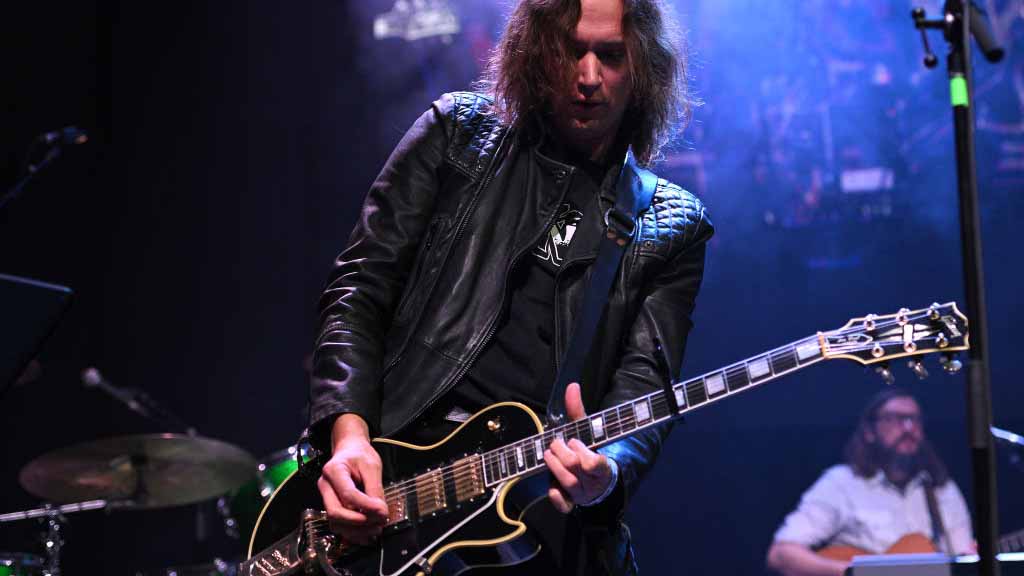
“He’s my favorite rhythm guitar player. I’d put him up there with Malcolm Young, actually. He was heavily influenced by Malcolm as a rhythm player. When he plays lead, he sounds like Lindsey Buckingham and when he plays rhythm, he sounds like Malcolm Young – so what’s not to like?!”
- The Permission to Land 20th Anniversary Global Tour begins in October 2023. For full dates, see TheDarknessLive.com.
Since graduating university with a degree in English, Ellie has spent the last decade working in a variety of media, marketing and live events roles. As well as being a regular contributor to GuitarWorld.com, she currently heads up the marketing team of a mid-scale venue in the south-west of England. She started dabbling with guitars around the age of seven and has been borderline obsessed ever since. She has a particular fascination with alternate tunings, is forever hunting for the perfect slide for the smaller-handed guitarist, and derives a sadistic pleasure from bothering her drummer mates with a preference for wonky time signatures.
“There’d been three-minute solos, which were just ridiculous – and knackering to play live!” Stoner-doom merchants Sergeant Thunderhoof may have toned down the self-indulgence, but their 10-minute epics still get medieval on your eardrums
“There’s a slight latency in there. You can’t be super-accurate”: Yngwie Malmsteen names the guitar picks that don’t work for shred





![A black-and-white action shot of Sergeant Thunderhoof perform live: [from left] Mark Sayer, Dan Flitcroft, Jim Camp and Josh Gallop](https://cdn.mos.cms.futurecdn.net/am3UhJbsxAE239XRRZ8zC8.jpg)







